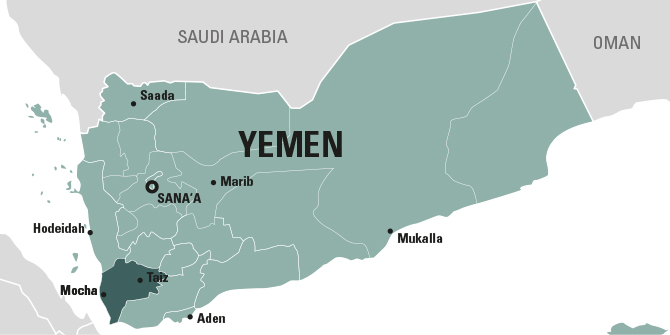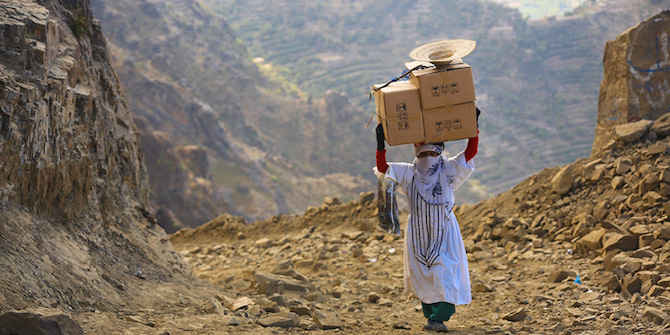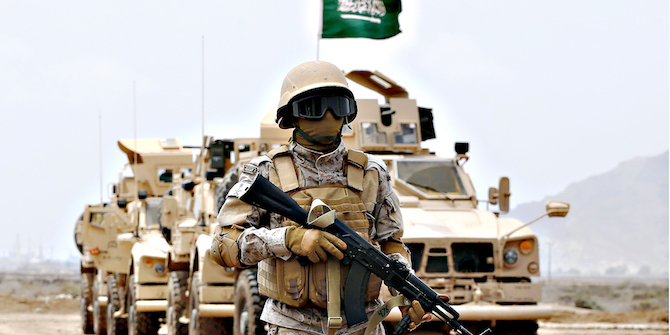by Sophie Désoulières
#LSEYemen
This memo was presented at a workshop on ‘Yemen’s Urban–Rural Divide and the Ultra-Localisation of the Civil War‘ organised by the LSE Middle East Centre on 29 March 2017.

Taiz governorate, in southwestern Yemen, has seen some of the most intense and sustained fighting since the conflict escalated in March 2015. Taiz city, once Yemen’s cultural hub surrounded by tall mountains and hills, is now divided by frontlines while the conflict, entering its third year, takes its toll on its residents. The city is a grim example of the urgent need for more medical aid, particularly basic healthcare.
There has never been more than a feeble lull in fighting in Taiz since the war reached the city. Even during periods of peace negotiations and ceasefires, the level of violence continued or even increased. The direct and deadly impact on the population is as obvious as it is appalling. An unacceptably high proportion of the war-wounded are women and children. The city centre has shrunk to a third of its pre-war population size. Yet, it is still a densely populated urban warzone where 200,000 people live amidst constant heavy artillery shelling, daily airstrikes and armed clashes. Myriad different groups – united not in their loyalty to Saudi-backed President Abdurabbo Mansour Hadi but in their opposition to the forces of the Houthis (Ansar Allah) and of former President Ali Abdullah Saleh-allied – referred to as the Resistance, hold the city centre surrounded by Houthi–Saleh forces. Streets in the city centre now known as the ‘enclave’ are controlled by different armed groups who frequently clash among themselves. Shells are launched into and out of the city centre while the movement of people and goods in and out is severely restricted and tightly controlled.
None of the warring parties in Taiz show any respect for the protection of civilians. Since May 2015, Médecins Sans Frontières (MSF)-run and supported facilities in Taiz city, on both sides of the frontline, have treated over 10,700 patients suffering from violence-related injuries. Our patients and their caregivers, on both sides of the frontlines around the city, have reported being injured by shelling while preparing lunch at home, wounded by airstrikes while walking to their fields, shot at by snipers while walking the streets outside their houses, and maimed by landmines while herding their livestock.
Medical services have also been caught up in the violence. Hospitals have been repeatedly hit by shelling and gunfire, one clinic has been hit by an airstrike, and ambulances have been shot at, confiscated or intruded in by armed men. Medical personnel have been shot at on their way to work, harassed, detained, threatened and forced to work at gunpoint. Lives are lost not only because of the constant shelling, indiscriminate airstrikes and gunfire but also because the fighting directly compromises access to healthcare. The wounded are dying because they cannot reach hospitals in time. Access to care is compromised by active frontlines, checkpoints and, in some areas, mines. Reaching the few hospitals still functioning not only entails long, costly and dangerous travel, but the cost of treatment is often prohibitively expensive. While MSF-supported and managed hospitals do not charge for treatment, they cannot alone meet the massive needs of a population deliberately targeted in this relentless war.
Two years since fighting started in Taiz, the city’s health services have largely collapsed – the result of physical damage to hospitals and of shortages of staff and medical supplies. Today, there are no public hospitals in Taiz city and its surroundings that are fully open and functioning. The few functioning hospitals lack staff, medications and basic supplies such as fuel and oxygen. Staff who remain often work around the clock in very difficult and insecure conditions. Salaries of public health workers have not been paid for months often depriving whole extended families of their only remaining source of income.

A crippled health system, combined with increasingly harsh living conditions, has prompted a decline in people’s health, with particularly acute consequences for vulnerable groups with low immunity such as pregnant women, new-born babies and young children. Most people have lost their jobs and the price of essentials, including food and water, has soared. Most families now live with little or no electricity and insufficient food and water. Many have been forced to flee their homes to escape the fighting, and now live in makeshift settlements in tents made from plastic sheeting, without adequate sanitation and without such essentials as mattresses, blankets or cooking equipment. Others are sheltering in overcrowded apartments or in empty school buildings. For most people, healthcare is prohibitively expensive, and people turn to it only as a last resort, when they are very sick and it may already be too late.
Staff in MSF-managed and supported hospitals in Taiz are increasingly seeing patients coming from well beyond the immediate area. While even before the onset of the current conflict, people living in surrounding rural areas had to travel relatively long distances to access healthcare, transport was available and affordable. Now higher fuel prices and insecurity have raised transport costs and many people living in rural areas cannot afford the cost of getting to a hospital. Active frontlines have also cut off access to hospitals within the city centre. The large public hospitals – Al Jomhori, Al Thawra and Yemeni Swedish, all located in Taiz city centre – were used by people from across the whole governorate. For specialised paediatric care, patients also came from neighbouring governorates to the Yemeni Swedish hospital, regarded as the best paediatric hospital in the region. Since the war started, however, access to all these hospitals has been effectively blocked for people living outside the city centre. For those inside, crossing the frontlines to get out of the city centre is extremely difficult, preventing patients in need of specialised care from being referred to hospitals in other governorates.
Taiz exemplifies the dire situation across the eleven governorates in Yemen where MSF works and witnesses the same issues: Yemenis are victims of both the direct and indirect consequences of this deadly and destructive war; access to quality, affordable healthcare is severely compromised; and after over two years of war, humanitarian and medical aid is still failing to meet people’s most basic needs.
Sophie Désoulières is Humanitarian Affairs Advisor at Médecins Sans Frontières. She tweets at @SophieDesoulier.
Other Contributions in the Series
- Yemen’s Rural Population: Ignored in an Already-Forgotten War, Helen Lackner
- Empire of Information: The War on Yemen and its Agricultural Sector, Martha Mundy
- The Battle to Control the ‘Commanding Heights’ of the Yemeni Economy, Rafat Al-Akhali
- Saada: Ground Zero, Gabriele vom Bruck
- From Protesters to Politicians: The Rise of the Houthis, Nawal Al-Maghafi
- Taiz Youth: Between Conflict and Political Participation, Maged Sultan
- Community Responses to Conflict in Taiz, Kate Nevens
- Aden: Relief Challenges and Opportunities, Awssan Kamal
- Marib: Local Changes and the Impact on the Future of Yemeni Politics, Alkhatab Al-Rawhani
- Hadhramout from Federalism to Civil War: Demands and Realities, Baraa Shiban






